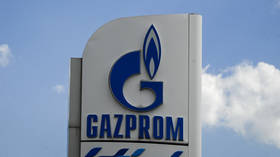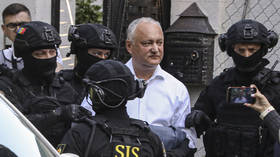Moldova paving way to join Romania & NATO – ex-president
The pro-EU Moldovan government is paving the way for foreign troop presence on its territory, former president Igor Dodon claims
A looming economic crisis, which Moldova is about to face due to rising gas prices, is just a step on the way to Chisinau losing its sovereignty, the former Moldovan president, Igor Dodon, claimed on Wednesday. President Maia Sandu’s pro-EU government plans to surrender Moldova to Romania, he warned.
The government is “unable to find a way out” of the current crisis, Dodon, who was the president of Moldova between 2016 and 2020, said in a Telegram post. Instead, the authorities allegedly lead the nation towards “economic, moral and political liquidation,” the politician claimed, adding that rising gas prices would inevitably lead to massive price hikes, as well as an energy and food crisis.
According to Dodon, this is all necessary for a “military and political merging” with Romania. The unification of Moldova and Romania – which enjoy close cultural ties and share a language – has been a recurring concept in Moldovan politics since the late 1980s. However, a poll conducted in March 2022 showed that only 11% of Moldovans support this idea, while one-third of the population openly opposes it and 42% believe it is just not the right moment for the move.
Dodon, however, believes that the current government might make the move without holding a referendum on the issue and then “make it legal through a parliamentary majority” and the Constitutional Court. The former president has not named any specific dates as to when that could happen.
Instead, he has also accused the government of planning to bring foreign – or rather NATO – troops on Moldovan soil and put an end to the nation’s decades-long policy of neutrality.
Such an angry reaction from the former president was sparked by amendments to the national border security law proposed by the government. The bill provoked heated debates in Moldova’s parliament last week.
A major point of contention was the government-sponsored proposal to create a legal framework to allow the EU border police – Frontex – to be deployed to Moldova’s borders with Romania and Ukraine. The government has argued it was needed to manage the crisis sparked by the conflict in neighboring Ukraine.
The bill has been vehemently opposed by both opposition parties in the parliament. “By voting on this project, we allow a military contingent to enter the territory of the Republic of Moldova at any time,” said MP Vadim Fotescu, a member of the Eurosceptic Sor Party.
Vladimir Voronin, another Moldovan ex-president, and a senior member of the opposition Socialist and Communist bloc, has called the proposal a “dangerous path” that could lead to the nation “ceding its sovereignty” in the field of border control and eventually losing its voice on issues such as European integration or the delimitation of the border with Romania.
Moldova’s head of parliament, Igor Grosu, has argued that Frontex is a “civilian” police force that would pose no threat to the nation. It is a “civilian contingent that wants to help us in this complicated situation at the border.” A senior official within the Interior Ministry, Serghei Diaconu, has also said that the potential arrival of the Frontex specialists “has nothing to do with the military contingent” and would hardly compromise Moldova’s neutrality.
Dodon’s words come amid an acute energy crisis in Moldova. The nation – which gets its gas from Russia – has accumulated a massive debt for earlier gas deliveries. According to the Russian state energy giant Gazprom, Moldovagaz owes it some $709 million.
Chisinau should have completed an audit of its debt before extending the contract with Gazprom in May but it has not yet, arguing that the conflict in Ukraine has prevented it from hiring a foreign auditor to do the job. Gazprom still continues to supply it with gas despite the delays in the contract extension.
Dodon himself is facing charges of “passive corruption, illegal financing of political parties and illicit enrichment” at home. The nation’s anti-corruption authorities and law enforcement agencies charged him with corruption and treason in late May. The politician brushed the accusations off as “fake” charges aimed at destroying the opposition.








Comments are closed.